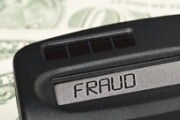
WASHINGTON — The White House, along with leading Senate Democrats, has unveiled a $1.3 billion piece of legislation aimed at combating pandemic-era fraud.
The White House on Tuesday promoted a bill written by Sens. Dick Durbin, D-Ill., the majority whip, Gary Peters, D-Ill., the chairman of the Homeland Security and Government Affairs Committee, and Ron Wyden, D-Ore., the chairman of the Finance Committee.
"Bad actors got their hands on money that was meant to help our communities get through what was an incredibly difficult time," Peters said on a White House call unveiling the bill.
The bill follows up on the budget request made by President Joe Biden earlier this year and allocates roughly $675 million to battling identity fraud. The bill would also provide $300 million to triple the Justice Department's COVID-19 fraud strike force teams, and $250 million to the Small Business Administration, Labor Department and their inspectors general to identify and recover pandemic-era fraud.
Pandemic programs like the Paycheck Protection Program brought the methods that the government uses to disburse funds to the public under closer scrutiny. Lawmakers and other critics have been especially pointed in their criticism of the widespread fraud by fintechs in the PPP program.
Since then, fintech participation in SBA loan programs,
The funding package signed by Biden last month
"Fraud and inefficiency characterize the Small Business Administration's history in direct lending," said Sen. John Kennedy, R-La., last month as he introduced a bill to prevent the Biden administration from being a direct lender for the loan program. "The government shouldn't crowd out private lenders that are already doing a good job getting funds to the small businesses that need them."
Another bipartisan framework released in February by Wyden and the Senate Finance Committee's ranking Republican, Sen. Mike Crapo of Idaho, would raise the statute of limitations for pandemic unemployment insurance fraud to 10 years. The framework was promoted by the White House alongside the fraud bill on Tuesday.
Also Tuesday, the Justice Department
While some of the measures announced by the Biden administration have bipartisan support, the legislation still faces a tough road on Capitol Hill. Although lawmakers of both parties have complained of waste and fraud in the pandemic-era program, previous efforts to patch holes in the way the government disburses aid, or to bolster protections to those affected by fraudsters, have fallen short.
"The time is now to ensure law enforcement has what it needs to finish the job," said Deputy Attorney General Lisa Monaco in a statement alongside the release of the Justice Department's report. "The statute of limitations must be extended and the necessary funding and data analytic tools secured for our prosecutors to recover hundreds of millions of dollars more in fraud proceeds, bring remaining offenders to justice, and disrupt criminal networks that continue to victimize our citizens."






